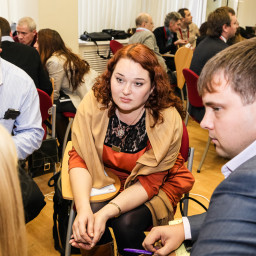
Our beliefs are not isolated pieces of data that we can take and discard at will. Instead, beliefs are deeply intertwined with other beliefs, shared cultural values, and our identities. To discard a belief means discarding a whole host of other beliefs, forsaking our communities, going against those we trust and love, and in short, … Continue reading Our Beliefs Are Not Isolated Pieces of Data That We Can Take and Discard at Will Steven Sloman

For both the rich and the poor, life is dominated by an ever-growing current of problems, most of which seem to have no real and lasting solution. Clearly, we have not touched the deeper causes of our troubles. It is the main point of this book that the ultimate source of all these problems is in … Continue reading We Have Not Touched the Deeper Causes of Our Troubles David Bohm

Abstract Recent findings indicate interventions can boost executive functions — mental processes that have long been thought to be static and not open to change. The authors examined whether and how short-term social interactions could create such cognitive benefits. Study 1 found that basic get-to-know-you interactions (with or without an explicit cooperative goal) boosted executive … Continue reading Friends (and Sometimes Enemies) with Cognitive Benefits: What Types of Social Interactions Boost Executive Functioning? Oscar Ybarra, Piotr Winkielman, Irene Yeh, Eugene Burnstein, Liam Kavanagh (2011)

We are oddly paradoxical creatures who long to be happy while creating our own suffering. We replay past anguish, anticipate future distress, and stew in self-righteous anger. In Hard to Be Human, Ted Cadsby focuses on five cognitive design flaws that foster underthinking and overreacting and reveals powerful strategies to overcome them. Greedy reductionism Addiction … Continue reading Hard to Be Human: Overcoming Our Five Cognitive Design Flaws by Ted Cadsby (2021)

Gurteen Knowledge Blog November 10, 2021, 16:47Research shows that engaging in short friendly conversations boosts people’s performance on a variety of cognitive tasks. A study in 2011, Friends (and Sometimes Enemies) With Cognitive Benefits: What Types of Social Interactions Boost Executive Functioning? by researchers at the University of Michigan, tested 192 undergraduates to determine which types of … Continue reading Engaging in Short Friendly Conversations Improves People’s Thinking Friends with Cognitive Benefits

Gurteen Knowledge Blog April 28, 2023, 16:07Cognition is a complex process that involves not just our brain but also our physical body, environment, and actions. This is the idea behind 4E cognition, which encompasses the four factors that shape cognition: embodiment, embeddedness, extension, and enaction. We commonly think that our cognitive processes occur solely in our … Continue reading The Four Pillars of Cognition Embodiment, Embeddedness, Extension, and Enaction

Cognition is a complex process that involves not just our brain but also our physical body, environment, and actions. This is the idea behind 4E cognition, which encompasses the four factors that shape cognition: embodiment, embeddedness, extension, and enaction. It’s common for us to think that all of our cognitive processes occur solely in our … Continue reading Beyond the Brain The multidimensional nature of cognition

The argumentative theory of reasoning proposes that reason did not evolve to help us to reason individually but to reason together – in other words, socially. Reasoning is generally seen as the process of thinking about something to help us come to better beliefs and decisions. However, there is substantial evidence that our reasoning process, … Continue reading The Argumentative Theory of Human Reason We did not evolve to reason individually but to reason socially

Not only is knowledge distributed, but cognition is also distributed. Not only is our knowledge distributed, but our cognition is also distributed. In other words, we don’t just think inside our heads. Other people and objects are also involved in cognition. Consciously or subconsciously, these other objects affect our thinking and decision-making. A simple example … Continue reading Distributed Cognition Not only is knowledge distributed, but cognition is also distributed

Research shows that engaging in short friendly conversations boosts people’s performance on a variety of cognitive tasks. A study in 2011 by researchers at the University of Michigan tested 192 undergraduates to determine which types of social interaction helped and which didn’t. The researchers concluded that engaging in short conversations where participants were instructed to … Continue reading Friends with Cognitive Benefits Engaging in short friendly conversations improves people’s thinking








